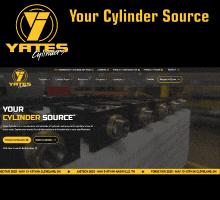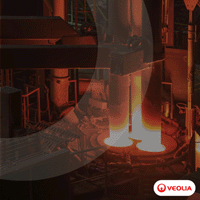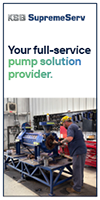Gerdau Comments on Positive First Quarter Performance
05/26/2014 - Gerdau’s 15.1% increase in consolidated net income in the first quarter of 2014 was due primarily to the effect of the exchange rate from dollars into reals (BRL), intensification in iron ore sales and the larger volume of steel sold on the domestic Brazilian market and in Latin American countries.
A total of 4.4 million tons of steel was sold during the same period, which is a 3.7% decline in relation to the first three months of 2013. This was mostly due to lower exports from Brazil — partially offset by the growth in sales volume on the domestic market — and the decline in long steel sales in the United States because of the harsh winter and increased imports in the region. Consolidated steel production, in turn, rose 3.3% compared to the first quarter of 2013, reaching 4.6 million tons.
The operating cash flow (EBITDA) of BRL 1.3 billion for the quarter represents a 48.6% increase in relation to the first quarter of 2013, while consolidated net profit reached BRL 440 million, an increase of 175%. These significant variations in EBITDA percentages and net profit are the result of better performance in most of the company’s business operations, as well as the reduced comparative basis (1st quarter of 2013), with performance notably lower due to maintenance shutdowns at production plants during the period.
"In the first quarter, Gerdau performed well in relation to previous years. This was the result of efforts by company management, the positive exchange rate effect and improved demand in different markets. In the coming quarters we will continue to work at improving operational efficiency, optimizing working capital and changing the debt profile in pursuit of continuously improving results. We will also continue to invest in our strategic projects, such as expanding iron ore and flat steel production in Brazil in line with our position of continuing to be “selective in CAPEX assessment,” said the CEO of Gerdau, André B. Gerdau Johannpeter.
Throughout the quarter, the international markets Gerdau targets behaved differently. In Brazil, domestic sales (excluding special steel production units) grew 1.8% in relation to the same period the previous year, totaling 1.4 million tons. Whereas exports from the country fell by 60.4% to 155,000 tons. In the United States and Canada (excluding special steels production units) 1.5 million tons were sold, 4.2% less than the first quarter of last year, affected by the harsh winter in the region and the substantial increase in imports.
Units in other Latin American countries (excluding Brazil) totaled 681,000 tons sold, 5.4% higher in relation to the first three months of 2013. In turn, sales conducted by the Special Steels Business Operation (including production plants in Brazil, the United States, India and Spain) totaled 758,000 tons, an increase of 13.6% compared to the first semester of 2013, which was influenced by greater demand in all regions, particularly India.
In 2014, iron mining activities that were previously reported as part of the Brazilian Business Operation are now presented separately as the new Iron Mining Business Operation. From January to March, iron ore sales reached 2 million tons against the 912,000 tons sold over the same period the previous year. Of this total, 812,000 tons were designated to Gerdau steel plants and 1.2 million to the market.
Gerdau investments reach BRL 678.6 million in the first quarter
In the first quarter investments in fixed assets (CAPEX) reached BRL 676.8 million as the result of previously disclosed investments. With respect to iron mining operations (Minas Gerais state), Gerdau continues to invest in increasing production capacity from 11.5 million tons a year to 18 million tons by 2016.
In Brazil, another relevant investment was the expansion of the specials steels plant in Pindamonhangaba (São Paulo state), where production caters primarily to the automotive industry. At the end of 2013, operations began at the new steel rolling mill, whose installed capacity went from 700,000 tons to 1.2 million tons, with the final portion of investments made in the first quarter of 2014.
In Argentina construction began on a steel mill in late February, with a production capacity of 650,000 tons of steel a year. With operations expected to begin in 2016, the steel plant will reduce the volume of imported steel in the country.
Major investments are being made in the United States in production plants located in Saint Paul (Minnesota), Midlothian (Texas) and Beaumont (Texas). A new continuous casting is being installed at the Saint Paul unit to replace the existing equipment. This will raise the unit’s production capacity from 450,000 tons to 550,000 tons in 2014. Investments at the Texas units focus on improving product quality and productivity of company units, which will also be concluded in 2014.
Gerdau raises capital of US$ 500 million in 30-year bonds in April
In April, Gerdau issued US$ 500 million 7.25% bonds due in 2044, the proceeds of which were used primarily in debt extension. Geographic distribution was 71% in the United States, 21% in Europe, the Middle East and Africa, 7% in Latin America and 1% in Asia-Pacific.
Also in April, Gerdau announced an exchange offer of part of the debt securities maturing in 2017 and 2020 for new 5.893% bonds maturing in 2024 with a value of US$ 1.25 billion. The company also announced a tender offer of part of the debt securities maturing in 2015 and 2020 to the value of up to US$ 250 million. Both operations will be concluded in the first two weeks of May.
Gerdau is the leading manufacturer of long steel in the Americas and a major global supplier of special long steels. The company recently began operations in two new Brazilian markets, with the production of flat steel and the expansion of its iron mining activities, initiatives that are expanding its product mix and the competitiveness of its operations. With more than 45,000 employees, Gerdau has industrial operations in more than 14 countries — the Americas, Europe and Asia — with a combined installed capacity of more than 25 million tons of steel a year. It is also Latin America’s biggest recycler and, worldwide, transforms millions of tons of scrap metal into steel every year, reinforcing its commitment to sustainable development in the regions where it operates. With more than 120,000 shareholders, Gerdau’s shares are listed on the New York, São Paulo and Madrid stock exchanges.
The operating cash flow (EBITDA) of BRL 1.3 billion for the quarter represents a 48.6% increase in relation to the first quarter of 2013, while consolidated net profit reached BRL 440 million, an increase of 175%. These significant variations in EBITDA percentages and net profit are the result of better performance in most of the company’s business operations, as well as the reduced comparative basis (1st quarter of 2013), with performance notably lower due to maintenance shutdowns at production plants during the period.
"In the first quarter, Gerdau performed well in relation to previous years. This was the result of efforts by company management, the positive exchange rate effect and improved demand in different markets. In the coming quarters we will continue to work at improving operational efficiency, optimizing working capital and changing the debt profile in pursuit of continuously improving results. We will also continue to invest in our strategic projects, such as expanding iron ore and flat steel production in Brazil in line with our position of continuing to be “selective in CAPEX assessment,” said the CEO of Gerdau, André B. Gerdau Johannpeter.
Throughout the quarter, the international markets Gerdau targets behaved differently. In Brazil, domestic sales (excluding special steel production units) grew 1.8% in relation to the same period the previous year, totaling 1.4 million tons. Whereas exports from the country fell by 60.4% to 155,000 tons. In the United States and Canada (excluding special steels production units) 1.5 million tons were sold, 4.2% less than the first quarter of last year, affected by the harsh winter in the region and the substantial increase in imports.
Units in other Latin American countries (excluding Brazil) totaled 681,000 tons sold, 5.4% higher in relation to the first three months of 2013. In turn, sales conducted by the Special Steels Business Operation (including production plants in Brazil, the United States, India and Spain) totaled 758,000 tons, an increase of 13.6% compared to the first semester of 2013, which was influenced by greater demand in all regions, particularly India.
In 2014, iron mining activities that were previously reported as part of the Brazilian Business Operation are now presented separately as the new Iron Mining Business Operation. From January to March, iron ore sales reached 2 million tons against the 912,000 tons sold over the same period the previous year. Of this total, 812,000 tons were designated to Gerdau steel plants and 1.2 million to the market.
Gerdau investments reach BRL 678.6 million in the first quarter
In the first quarter investments in fixed assets (CAPEX) reached BRL 676.8 million as the result of previously disclosed investments. With respect to iron mining operations (Minas Gerais state), Gerdau continues to invest in increasing production capacity from 11.5 million tons a year to 18 million tons by 2016.
In Brazil, another relevant investment was the expansion of the specials steels plant in Pindamonhangaba (São Paulo state), where production caters primarily to the automotive industry. At the end of 2013, operations began at the new steel rolling mill, whose installed capacity went from 700,000 tons to 1.2 million tons, with the final portion of investments made in the first quarter of 2014.
In Argentina construction began on a steel mill in late February, with a production capacity of 650,000 tons of steel a year. With operations expected to begin in 2016, the steel plant will reduce the volume of imported steel in the country.
Major investments are being made in the United States in production plants located in Saint Paul (Minnesota), Midlothian (Texas) and Beaumont (Texas). A new continuous casting is being installed at the Saint Paul unit to replace the existing equipment. This will raise the unit’s production capacity from 450,000 tons to 550,000 tons in 2014. Investments at the Texas units focus on improving product quality and productivity of company units, which will also be concluded in 2014.
Gerdau raises capital of US$ 500 million in 30-year bonds in April
In April, Gerdau issued US$ 500 million 7.25% bonds due in 2044, the proceeds of which were used primarily in debt extension. Geographic distribution was 71% in the United States, 21% in Europe, the Middle East and Africa, 7% in Latin America and 1% in Asia-Pacific.
Also in April, Gerdau announced an exchange offer of part of the debt securities maturing in 2017 and 2020 for new 5.893% bonds maturing in 2024 with a value of US$ 1.25 billion. The company also announced a tender offer of part of the debt securities maturing in 2015 and 2020 to the value of up to US$ 250 million. Both operations will be concluded in the first two weeks of May.
Gerdau is the leading manufacturer of long steel in the Americas and a major global supplier of special long steels. The company recently began operations in two new Brazilian markets, with the production of flat steel and the expansion of its iron mining activities, initiatives that are expanding its product mix and the competitiveness of its operations. With more than 45,000 employees, Gerdau has industrial operations in more than 14 countries — the Americas, Europe and Asia — with a combined installed capacity of more than 25 million tons of steel a year. It is also Latin America’s biggest recycler and, worldwide, transforms millions of tons of scrap metal into steel every year, reinforcing its commitment to sustainable development in the regions where it operates. With more than 120,000 shareholders, Gerdau’s shares are listed on the New York, São Paulo and Madrid stock exchanges.



.png?lang=en-US&ext=.png)




